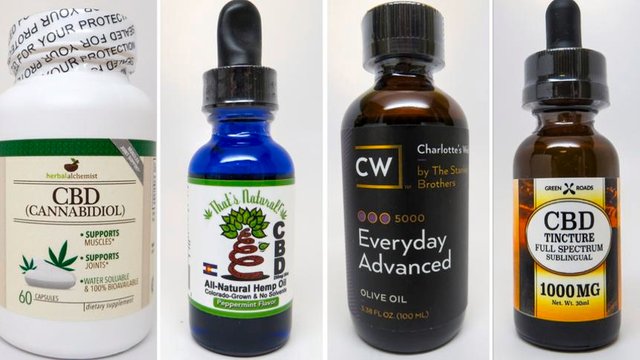This week, the organization in charge of policing food and drug market issued cautioning letters to four organizations that are "wrongfully offering items online that case to forestall, analyze, treat, or cure malignancy without confirmation to help these results." It said in an announcement, "The unlawfully sold items professedly contain cannabidiol (CBD), a part of the cannabis plant that isn't FDA endorsed in any medication item for any sign."
FDA Commissioner Scott Gottlieb said in the announcement, "We don't give organizations a chance to showcase items that purposely go after wiped out individuals with ridiculous cases that their substance can psychologist or cure malignancy and we're not going to look the other path on authorizing these standards with regards to cannabis containing items."
The organizations that got the notice letters are required by law to react inside 15 working days, demonstrating what steps they have - or will - take to address the FDA's worries.
"Inability to speedily revise these infringement may bring about legitimate activity without additionally see, including, without impediment, seizure and directive," each of the four letters cautioned.
What items were focused on?
The FDA said the 25 or more items that are a piece of this crackdown incorporate oil drops, cases, syrups, teas, topical salves and creams.
The four organizations that got cautioning letters on Wednesday are Greenroads Health, Natural Alchemist, That's Natural! Promoting and Consulting and Stanley Brothers Social Enterprises LLC.
Greenroads Health did not react to a demand for input.
Normal Alchemist declined a demand for input.
In an announcement, That's Natural! stated, "We are amped up for the chance to address the FDA's Warning letter by consenting to their notice letter and bringing down the asked for connections and data, including that to peer-looked into diary articles, on our site and web-based social networking."
Stanley Brothers said in an announcement, "We consider administrative consistence important. Our clients love to share their exceptionally individual stories about how our items enhanced their lives or those of their friends and family. ... We will work with the FDA to guarantee that we better screen how we share outsider tributes."
CNN highlighted the Stanley siblings in a 2013 narrative, "Weed," about a young lady who battled with serious seizures.
"There are a developing number of compelling treatments for some malignancies," Gottlieb said. "At the point when individuals are permitted to wrongfully showcase specialists that convey no settled advantage they may guide patients far from items that have demonstrated, against tumor impacts that could broaden lives."
When issuing cautioning letters about other "illicit" disease medications in April, the FDA said shoppers ought not utilize them "since they might be dangerous and could keep a man from looking for a suitable and conceivably life-sparing tumor determination or treatment," as indicated by Douglas W. Stearn, chief of the FDA's Office of Enforcement and Import Operations."We urge individuals to stay watchful whether on the web or in a store, and abstain from obtaining items advertised to treat disease with no verification they will work. Patients ought to counsel a human services proficient about appropriate aversion, finding and treatment of growth."
What should shoppers pay special mind to?
"I figure the greatest warning would be that any item that hasn't experienced FDA survey is making a claim that it can treat or cure disease," Jason Humbert, an administrative operations officer in the FDA's Office of Regulatory Affairs, told CNN in April. "Just items that have been assessed - endorsed FDA drugs - can make those cases. So if a purchaser stumbles upon a site or an online networking webpage and they see that this item is promoted as a characteristic cure for disease or a characteristic treatment for tumor, they ought to be exceptionally distrustful, in light of the fact that unless that item has been assessed by FDA, there's no motivation to trust it's sheltered or successful for that utilization."
Despite the fact that cases differ from item to item, the FDA says fake disease items "frequently utilize a specific vocabulary." The organization recognized these expressions as the most widely recognized warnings:
Treats all types of malignancy
Supernaturally executes malignancy cells and tumors
Psychologists threatening tumors
Specifically slaughters malignancy cells
More viable than chemotherapy
Assaults disease cells, leaving sound cells in place
Cures disease
"The larger point is that these items are untested, and a portion of the fixings may exhibit guide hazard to the shopper's wellbeing or interface with any pharmaceuticals they may take," Humbert said in April. "They're not a substitute for proper treatment, and utilizing these items can jeopardize buyers' wellbeing as well as waste their cash and waste their chance, also."
In the current week's announcement, Gottleib stated, "We have a commitment to give guardians and patients the certainty that medications making tumor treatment claims have been deliberately assessed for security, adequacy, and quality, and are observed by the FDA once they're available.
"We perceive that there's enthusiasm for creating treatments from maryjane and its parts, yet the most secure route for this to happen is through the medication endorsement process - not through unconfirmed cases made on a site. We bolster sound, logically based research utilizing parts got from pot, and we'll keep on working with item engineers who are keen on bringing sheltered, powerful, and quality items to advertise
